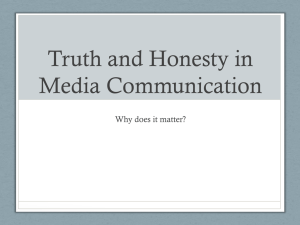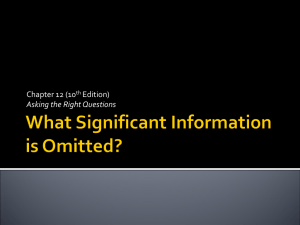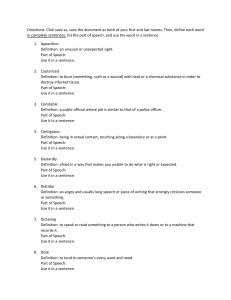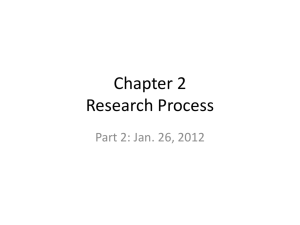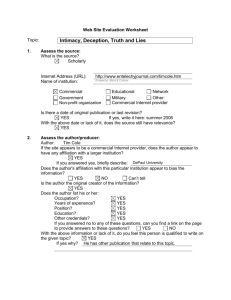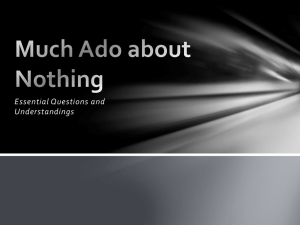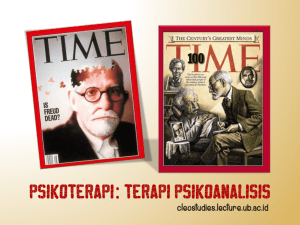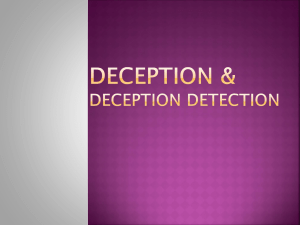U.S. Army War College, and Triangle Institute for Security Studies
advertisement
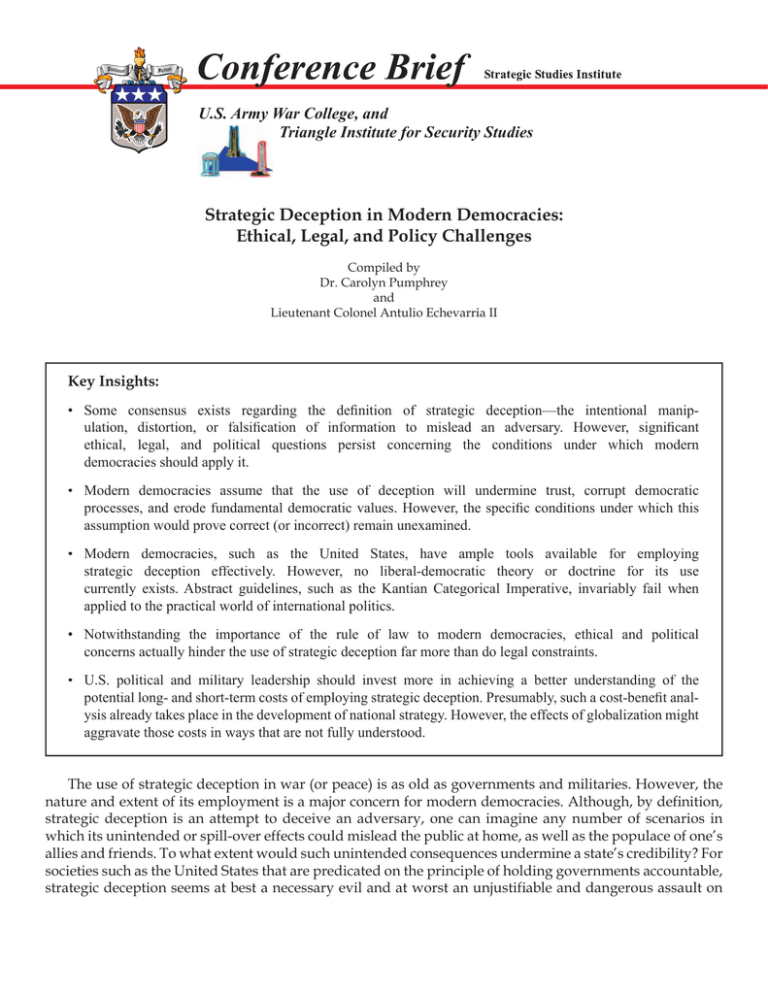
U.S. Army War College, and Triangle Institute for Security Studies Strategic Deception in Modern Democracies: Ethical, Legal, and Policy Challenges Compiled by Dr. Carolyn Pumphrey and Lieutenant Colonel Antulio Echevarria II Key Insights: • Some consensus exists regarding the definition of strategic deception—the intentional manipulation, distortion, or falsification of information to mislead an adversary. However, significant ethical, legal, and political questions persist concerning the conditions under which modern democracies should apply it. • Modern democracies assume that the use of deception will undermine trust, corrupt democratic processes, and erode fundamental democratic values. However, the specific conditions under which this assumption would prove correct (or incorrect) remain unexamined. • Modern democracies, such as the United States, have ample tools available for employing strategic deception effectively. However, no liberal-democratic theory or doctrine for its use currently exists. Abstract guidelines, such as the Kantian Categorical Imperative, invariably fail when applied to the practical world of international politics. • Notwithstanding the importance of the rule of law to modern democracies, ethical and political concerns actually hinder the use of strategic deception far more than do legal constraints. • U.S. political and military leadership should invest more in achieving a better understanding of the potential long- and short-term costs of employing strategic deception. Presumably, such a cost-benefit analysis already takes place in the development of national strategy. However, the effects of globalization might aggravate those costs in ways that are not fully understood. The use of strategic deception in war (or peace) is as old as governments and militaries. However, the nature and extent of its employment is a major concern for modern democracies. Although, by definition, strategic deception is an attempt to deceive an adversary, one can imagine any number of scenarios in which its unintended or spill-over effects could mislead the public at home, as well as the populace of one’s allies and friends. To what extent would such unintended consequences undermine a state’s credibility? For societies such as the United States that are predicated on the principle of holding governments accountable, strategic deception seems at best a necessary evil and at worst an unjustifiable and dangerous assault on core values. The term strategic deception itself brings with it a great deal of baggage that makes objective discussion of it extremely difficult. In an effort to strip away some of that baggage and get at the root of the nature, extent, and potential applications of strategic deception, the Triangle Institute for Security Studies (TISS) and the U.S. Army War College Strategic Studies Institute (SSI) held a conference on October 31-November 1, 2003, at the Friday Center in Chapel Hill, North Carolina. The purpose of the conference was to address the ethical, legal, and policy challenges that arise when democratic governments use deception. The Center for the Study of Professional Military Ethics at the U.S. Naval Academy and Duke University’s Kenan Institute for Ethics participated as cosponsors. Presenters and attendees included military historians, philosophers and ethicists, members of the military and intelligence communities, lawyers, businessmen, and members of the press. representatives from the military attempted to clarify that strategic deception is directed at a foe, not at the friendly populace. Therefore, if used appropriately, it would not threaten the core values of a democracy. Measures taken to limit unintended consequences before, during, and after the act should form an essential part of any use of strategic deception. In contrast, some members of the media maintained that the use of strategic deception would invariably involve the press as primary or intermediate targets. Understandably, the media expressed outrage at the possibility of being exploited in this way. At times, their argument wrongly equated the act of misleading the press with an intent to deny freedom of the press, an obvious violation of a right guaranteed by the U.S. Constitution. However, most members of the press agreed that they should not have access to, or publicize, details about military operations. One presenter pointed out that the internet has changed the equation regarding freedom of the press by placing the capability to publish information (whether misleading or otherwise) into the hands of every citizen. The conference also revealed that laws and ethical standards offer little in the way of an argument for or against the use of deception. Experts on military and international law stressed that legal constraints do little to limit the use of deception, especially in war. International law directly prohibits only perfidy (deceptive measures which take advantage of symbols or positions of trust―such as the use of a white flag or a Red Cross― to attack, wound, or kill an enemy). Also, American courts traditionally are reluctant to interfere in what they see as “policy matters.” This reluctance stems in part from the fact that the U.S. Constitution gives a great deal of freedom of action to the President in anything related to war. U.S. leaders, therefore, find themselves with a fair amount of legal latitude when it comes to the use of strategic deception. Similarly, modern ethical systems do not provide any consistent argument for or against the use of deception. For example, one might argue―as the 18th century philosopher Immanuel Kant did―that lying in any form and for any purpose is a categorical evil. Yet, other theories, such as that of enlightened self-interest and service for the common good, do justify deceit in war. In fact, MAJOR ISSUES The conference addressed a wide range of issues, but the discussion generally centered around three overlapping questions. First, can a modern democracy like the United States justify the use of strategic deception―defined as the intentional manipulation, distortion, or falsification of information to mislead an adversary? Although the conference focused on wartime uses of deception, the term wartime included war, preparation for war, and what has come to be known in service vernacular as military operations other than war. Second, if the United States can justify the use of strategic deception, what guidelines or principles, if any, should it follow when employing it? In other words, in what ways should modern democracies limit their use of strategic deception so as not to threaten their core values? Third, how can the United States improve its current capabilities, particularly against determined foes, and how can it protect itself against being deceived? A brief summary of the discussion follows. CAN MODERN DEMOCRACIES JUSTIFY THE USE OF STRATEGIC DECEPTION? As one might expect, answers to this question varied considerably. On the one hand, 2 the conference highlighted an important ethical paradox: To save its democracy, the United States might have to resort to deception which might in turn harm the very values and institutions it is fighting to preserve. Political concerns―which tend to include ethical and legal considerations―emerged as the primary determinant in whether the use of strategic deception is justifiable. The majority of those present at the conference favored the “realist” view that modern democracies can and should use strategic deception if they employ proper damage control and minimize the risks to their core values. politics where states necessarily mislead each other in order to protect their vital interests without having to resort to war. Feasibility. Clearly, the use of strategic deception (or any political-military tool for that matter) depends on having the necessary wherewithal at hand. Evaluating the means at hand is a basic step in formulating sound strategy. One presenter posed the important question as to whether the United States was actually keeping pace with the world-wide development of new technological means to invade information systems and create misinformation. Are we, in fact, deceiving ourselves regarding our alleged technological superiority? The United States does have many natural assets including high levels of technological experience and citizens noted for their initiative and creativity. Its culture is diverse and reflects a certain facility with “spinning” information and “advertising” goods. However, the conference pointed out that the United States has not always made the best use of its assets. It has not done well at capitalizing on the diversity of its culture and its ethnic groups to penetrate its adversaries at the highest levels, for example. Nor does it invest in the resources necessary to fully understand foreign cultures. Understanding one’s opponents, what they want and how they think, is absolutely crucial when ascertaining the feasibility of a strategic deception plan. Costs-versus-Benefits. As previously noted, strategic deception can have unintended consequences. In extremely mismanaged cases, it even can erode international trust and harm those political initiatives that depend on international cooperation. It can also create mistrust between the government, the military, the public, and the media. Fortunately, democratic societies rely less on trust than on accountability. Government officials are extended a conditional trust that entitles the populace to take action to remove those officials should they violate that trust. Hence, democratic societies may prove more resilient than generally acknowledged by those who argue that deception will necessarily undermine core democratic values. This particular topic requires further research. For obvious reasons, cost-benefit analyses and other forms of risk management must take place whenever states choose to employ strategic deception. In addition, the rapid spread of WHAT GUIDELINES SHOULD APPLY TO THE USE OF STRATEGIC DECEPTION? If modern democracies are justified in using strategic deception, what guidelines, if any, should they follow? A tentative set guidelines did emerge in the course of the conference, but they could apply to any form of government, not just democracies. The use of deception, like any political-military tool, should follow the practical guidelines of necessity, feasibility, and a costs-versus-benefits analysis. Necessity. Most participants agreed that the use of strategic deception is justified if 1) national survival is at stake, and 2) deception is crucial to victory. For example, Operation BODYGUARD in 1944, which deceived the Axis powers as to the true D-Day invasion site, played a major role in securing victory for the Allies in World War II. National survival was clearly at stake, and the deception itself was critical to achieving a successful landing. Of course, one could use the same justification for Hitler’s Plan Yellow, the invasion of France in 1940. In Hitler’s eyes, national survival was at stake, and the particular deception employed, which misled the French and British as to the location of the German main attack, was crucial to victory. One presenter maintained that deception is a tool of the weak and that, as the most powerful nation on earth, the United States should eschew deception in favor of using its might to achieve its goals. However, this facile solution fails to take into account the fact that the use of overwhelming force will generate unintended consequences as well, and that these might outweigh those caused by the use of deception. In any case, a certain amount of deception is inherent in the realm of international 3 information and information technologies currently associated with the effects of globalization might complicate such analyses in ways that political leaders may not yet fully understand. This topic requires more attention as well. ently ill-suited to engage in strategic deception. The course of the discussion revealed that while democracies do not keep secrets particularly well and their political processes are generally slow and cumbersome, history shows that they can indeed carry out strategic deception successfully. Nor is the United States culturally averse to deception; we have used it effectively throughout our history. In fact, some members of the international community in general―and the Chinese in particular―are convinced that the United States is not only good at deception, but that its successful use of deception explains our rise to power. This conference thus helped clear away much of the confusion surrounding the issue of strategic deception and helped point the way for further study. SSI and TISS will publish select papers from the conference over the next several months. HOW CAN THE UNITED STATES IMPROVE ITS CAPABILITIES? Despite the dangers, common sense dictates that the United States should not ignore a tool that can help it achieve its goals with greater efficiency. While some may argue that the United States is now in a position of strength and, as such, less dependent on deception, strength is always relative and never without its Achilles’ heels. Moreover, some of the avowed enemies of the United States remain committed to its destruction. They continue to think and adapt to that end. The United States, therefore, has a threefold task. First, it must develop stronger theoretical foundations for understanding deception, namely, what it is that enables one to be deceived. For example, it is easier to deceive an enemy into believing something he or she wants to believe, than it is to get them to embrace an entirely new idea. A more developed theory of deception would thus improve the probability that our strategic deception plan will work. Second, it must enhance professional military education concerning strategic deception. While tactical commanders understand the importance of deception and routinely include deception plans in their operational planning, senior leaders must understand its potential effects at the strategic level and the role that cyberspace could play in it. U.S. political and military leaders should reexamine current methods of risk assessment and risk management to ensure they are adequate for today’s global environment. Third, the academic community should examine more closely the potential impact of a government’s use of strategic deception on core democratic values. The key may well be that, regardless of the political-military tool used, government must remain accountable to the public. In what ways can strategic deception be employed while still preserving that accountability? The conference began with the underlying assumption that modern democracies were inher- ***** The views expressed in this brief are those of the authors and do not necessarily reflect the official policy or position of the Department of the Army, the Department of Defense, or the U.S. Government. This conference brief is cleared for public release; distribution is unlimited. ***** More information on the Strategic Studies Institute’s programs may be found on the Institute’s Homepage at http://www.carlisle.army.mil/ssi/ or by calling (717) 245-4212. 4
